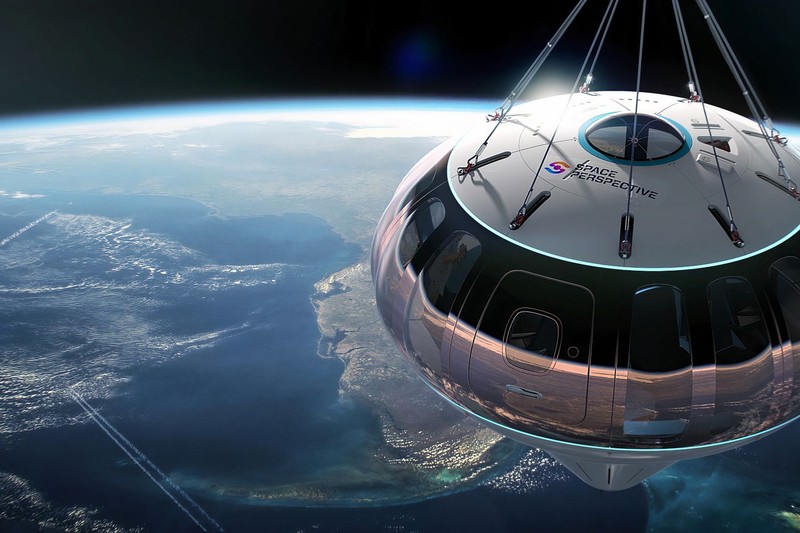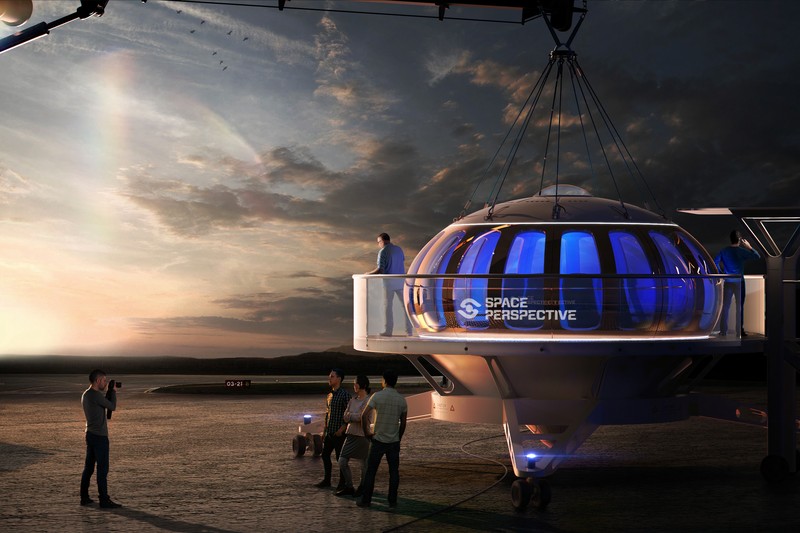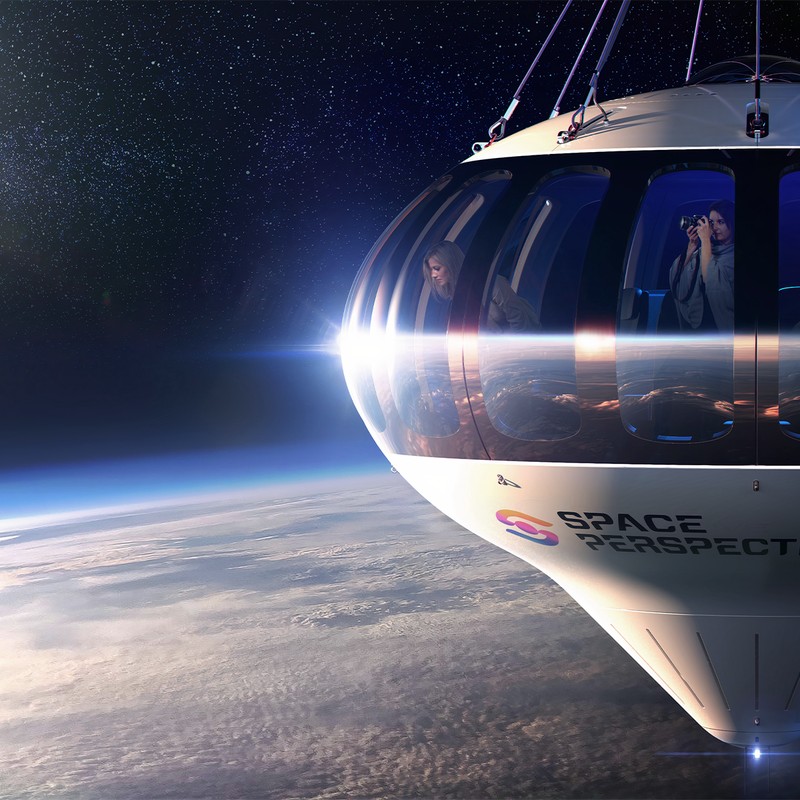My Interesting Job: Jane Poynter, Co-Founder Of Space Perspective
My career in space flight started when I was part of Biosphere 2 in the 90s. It’s a science research facility in Arizona that was built to be an artificial, materially closed ecological system. It’s a glass and steel structure and remains the largest closed ecological system ever created. I lived in it for two years as part of the original crew that tested the facility.
One of the seminal experiences I had in Biosphere 2 was similar to what astronauts report after going to outer space. Specifically, I’m talking about experiencing an extraordinary connection to our planet and the people who inhabit it. It’s said that breaching the atmosphere makes you realise the planet is much smaller than you think it is, and I had a similar experience in Biosphere 2. I knew moment to moment that the oxygen I was breathing came from the plants around me and the CO2 I was exhaling fed them to provide the food I was eating.
Since the Biosphere, I’ve founded several companies. One was Paragon Space Development Corporation, which develops technologies for extreme environments like outer space and under water. In October 2014, we also broke Felix Baumgartner’s space jump world record by taking Google executive Alan Eustace to 136,000ft in a space suit that was designed by my team. We intentionally dropped him from a space balloon, and he free fell for nearly five minutes, breaking the speed of sound, before opening his parachute at around 12,000ft to come in for a safe landing.
For a long time, I’ve wanted to find a way to take people to space in a realistic way. At Space Perspective, we want to open the door to as many people as possible. Taber MacCallum – another founding crew member of Biosphere 2 and my co-founder (and husband) – thinks similarly, which is why we founded the company. We’re incredibly collaborative and want to find an accessible way for people to have this astronaut experience of seeing Earth from space and understanding more about our own existence. Our full team is about 50 people and we’re based at a space port campus adjacent to Kennedy Space Center in Florida.
I honestly can’t imagine working without my husband. We first worked together on a ship sailing across the Indian Ocean and up the Red Sea as part of our Biosphere training. You get to know each other very well in those kinds of environments. It was the same when we entered the Biosphere –the best of times and the worst of times. There also wasn’t the Internet or anything back then, so you can imagine how isolating it felt. Safe to say, we coped with lockdown like total pros! What we’re doing with Space Perspective, it’s not an overstatement to say it’s the culmination of our life’s work.


What the rocket-based companies are doing is quite different to us. We want to develop a gentle and enjoyable way for people to go into space, and that’s not their main focus right now. A rocket flight imparts a high level of G-force and requires intense training. We’re aiming to give people a safe and responsible way to go into space. Plus, another big focus for us is our environmental impact – our prototype spaceship is essentially zero emissions, and our company is carbon neutral. At the moment, rocket flight puts significant carbon strain on the planet.
Another difference is we look at space in general as a destination. Others put more focus on going to the moon or something specific. For us, it’s about the experience first and foremost. This industry is going to be demand led for years to come – an extraordinary amount of people want to go to space, including me. We put tickets on sale in June 2021 and by November that year, we’d sold more than 500 spots. To put that in context, each of our capsules holds eight people and a pilot, and lots of flights have been booked out by families or groups of friends.
I don’t think of my work like a job. I love it because of the people I get to meet and work with. Everyone’s so incredibly competent but business is a human endeavour, so it’s important they’re all good people too. Any aspiring entrepreneurs should put that at the centre of their business. It’s why I enjoy walking round the company and chatting to my employees about what they’re doing that day specifically – I want to know what challenges they’re solving or ideas they’re having. We want all our employees to feel like it’s their job to speak up if they see something could be done better – especially when it comes to the technical side and building our safety profile.
We have some unbelievable minds on our team. For example, we have the person who developed and executed the manufacturing of all the composites for SpaceX’s Crew Dragon and Falcon 9 space vehicles. We also have the person who was in charge of all their marine recovery – which is what we’ll have to do when the capsule returns to Earth. Our chief marketing officer also has a background in luxury hospitality. They all help build a culture and value system that feels authentic to the mission we’re trying to execute.
What’s amazing is you can get involved in space flight from almost any angle. We have sales and marketing divisions, content creators, art directors, finance and HR. That’s in addition to all the technical roles and expertise required to execute our vision. It really is a world open to a variety of backgrounds and knowledge – personally, I think this helps build the diversity of the company, which trickles down into a diversity of thought and helps make us a better business all round.
My own background is in agriculture and ecology – which is what led me to Biosphere 2 – and then my dad was entrepreneur, so I probably got that gene from him. The important takeaway for anyone reading this is to know you can apply your strengths to so many different things. For anyone wanting to get into the industry, I’d say go for it. Just because you’ve been doing something in one industry doesn’t mean you couldn’t do it for an aerospace company, if space is your passion. These companies need support on the ground, and a lot of them are looking to build complete ecosystems encompassing a range of expertise and skills.
We just closed a big financing round which should get us to commercial flight. We’re planning to launch our first commercial flight around the end of 2024 and our first crewed flight in 2023. Hopefully around the end of 2022, we’ll start a lot of testing – we can actually fly the capsules autonomously without humans on board, which is great for testing our safety requirements. Right now, we’re letting our investors – most of whom are incredibly helpful – get into our capsule mock-up to have a conversation about what the experience looks and feels like.
It’s been an eye-opening experience as a woman in the space race. Back in the 90s, I was often the only female in the room – which was worse because I was young – but I’ve tried not to focus on the fact I’m a woman working in a man’s world. Instead, I’ve poured my energy into the mission we’re trying to accomplish. Perhaps because I’ve founded the companies I’ve worked for, I’ve been able to create an environment that welcomes women and diversity of all kinds. I also don’t have children – which has been helpful in committing to my vision. But perseverance is one of my biggest strengths anyway.
Thankfully, the aerospace industry has changed – not as much as we’d like – but it was great to see two women and two men on board SpaceX’s Inspiration 4. In total, about 90% of the people who have been to space are men. For me it’s not about being a female entrepreneur, it’s about being the best entrepreneur I can be. Space travel is no longer an idea of the future – it’s here and I’m so proud to be a part of an industry that’s going from strength to strength.
For more information, visit SpacePerspective.com
DISCLAIMER: We endeavour to always credit the correct original source of every image we use. If you think a credit may be incorrect, please contact us at info@sheerluxe.com.


